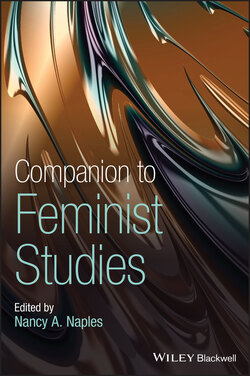Читать книгу Companion to Feminist Studies - Группа авторов - Страница 67
The Delphy–Barrett and McIntosh Debate
ОглавлениеIn 1979, Michèle Barrett and Mary McIntosh published a critique of Delphy in the first issue of the British journal Feminist Review. Barrett and McIntosh take Delphy to task for arguing that the oppression of women has “a material rather than an ideological basis,” using Delphy's refutation of Freudo‐Marxism as the basis for their claim. Yet, this reading seems to be based on a misunderstanding of Delphy's argument and indeed the vocabulary she uses. Delphy does not refute “ideology” in either of the two essays discussed above (Delphy 1998a, b), nor indeed anywhere else in her writing; indeed, in her reply to Barrett and McIntosh published in 1982, she affirms the contrary, and emphasizes the inextricable link between the economic and the ideological (Delphy 2001).
The term she uses in the writings to which Barrett and McIntosh refer is not ideology but “idealism,” and she uses it in a Marxian sense. Marx's critique of “idealism” was not a refutation of the role of ideology per se; it was rather a refusal of the Hegelian premise that the starting point for understanding the world and the means for acting upon it were human contemplation. Marx argued rather than the material conditions of people's lives were a necessary starting point not only for reflecting upon the world but for acting to change it. Indeed, in his Theses on Feuerbach, a series of preparatory notes for a book he authored with Engels on, precisely, ideology (The German Ideology, 1932), Marx famously critiqued philosophers for seeking to understand the essence of the human in a solely ideational way, divorced from economic and social relations, and thus to understand the world in various ways without acting upon it, where the point was to act upon the world in order to change it (Marx 1845).
Similarly, Delphy's materialism is grounded in the understanding that, as Stevi Jackson puts it, “ideas in themselves cannot be seen as the cause of any form of social division or oppression. On the contrary, inequalities are rooted in actual social practices” (Jackson 1996, p. 38), and ideology develops not in isolation from these social practices but as a means of legitimizing them. Barrett and McIntosh thus misread Delphy's original argument: Delphy does not ignore ideology but locates it as the product of material relations of domination.
This, however, is not Barrett and McIntosh's only criticism. They also disagree with Delphy's analysis of marriage and domestic labor as a mode of production that is separate and different from the mode of production in waged work analyzed by Marx, and indeed historically anterior to it. Instead, they place the accent on the primacy of class as the fundamental oppressive structure. We find in this disagreement the core of the analytical and political difference between Marxist and radical feminists on both sides of the Channel, and a foreshadowing of what would become the major poststructuralist disagreement with radical feminism and some expressions of Marxist feminism: the place and role of discourse in the relationship of male domination of women. Barrett and McIntosh also dismiss Delphy for being too “polemical/political” and not sufficiently “theoretical”; they do so, however, in an article that is itself polemical.
In 1982, Delphy published a reply to Barrett and McIntosh, in which she argued that she had been disingenuously misrepresented, and criticized the authors for hierarchizing “theory” (valorized) and “politics” (devalorized). The core of her argument, however, is that Barrett and McIntosh, in criticizing Delphy for using Marx's method (materialism) without adhering to Marx's analysis of the relations of domination (solely located in capitalist class exploitation), have, like other Marxist scholars, confused Marx's method on the one hand with his analysis of capitalism on the other hand, or rather, “reduc[ed] the former to the latter” (Delphy 2001, p. 128, my translation). Delphy further argues that Marxists posit this amalgamated method‐analysis as the only possible interpretation of contemporary society. This totalizing approach that posits “Marx” as a whole package to take or to leave is a form of both deification and reification, a theoretical and political border‐policing that prohibits those who do not accept the whole “package” from using the materialist method as a tool of analysis. Indeed, for Delphy, materialism is not a possible tool of analysis, it is the tool, “precisely because it is the only theory of history for which oppression is the fundamental reality, the starting point” (Delphy 2001, p. 134, my translation).
The Barrett‐McIntosh–Delphy polemic is emblematic of the deep divisions, during the early years of second‐wave feminism, and to some extent still, between radical and Marxian feminists – although that divide is more accurately characterized today as opposing radical and poststructuralist or postmodern feminists, or queer theorists. It is also illustrative of the geohistorical confusion surrounding the term “materialist feminism.”
